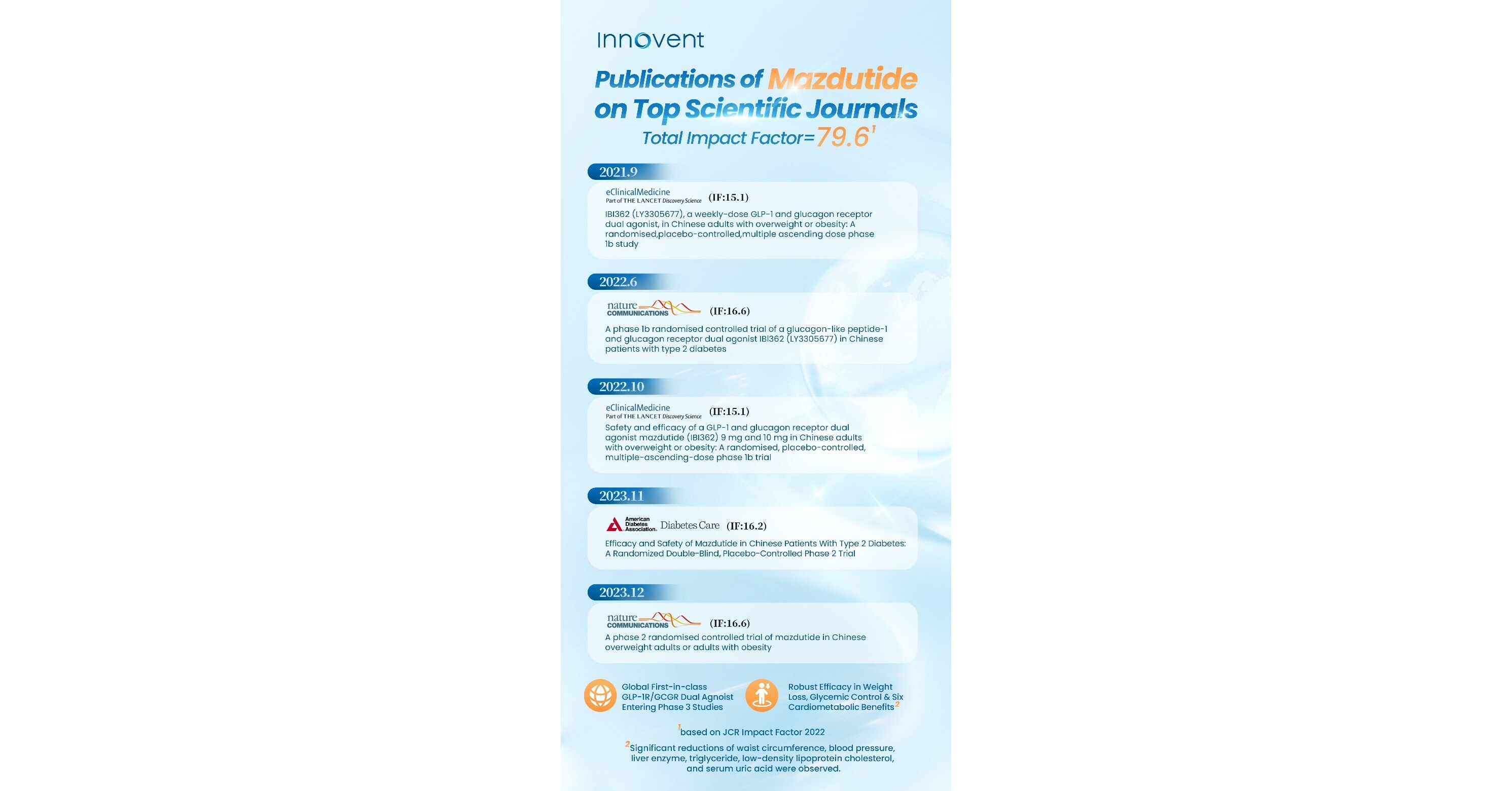ROCKVILLE, Md. and SUZHOU, China, Dec. 17, 2023 /PRNewswire/ — Innovent Biologics, Inc. (Innovent) (HKEX: 01801), a world-class biopharmaceutical company that develops, manufactures and commercializes high-quality medicines for the treatment of oncology, metabolic, autoimmune, ophthalmology and other major diseases, announces that results of a Phase 2 clinical trial of mazdutide (Innovent R&D code: IBI362), a glucagon-like peptide-1 receptor (GLP-1R) and glucagon receptor (GCGR) dual agonist, in Chinese patients with overweight or obesity were published in Nature Communications.
Professor Linong Ji, the leading principal investigator of the study, Peking University People’s Hospital, stated, “As a chronic disease with complex underlying causes, obesity is one of the leading risk factors of type 2 diabetes, fatty liver, cardiovascular and cerebrovascular diseases, joint diseases, sleep apnea in addition to cancers. Obesity requires increased public awareness of long-term treatment and management with effective and science-backed approaches. China has the largest obese population; however, no safe and efficacious pharmacotherapy is approved for obesity so far. I am very pleased to see the Phase 2 full results of the GLP-1R/GCGR dual agonist mazdutide in Chinese patients with overweight or obesity were accepted and published in Nature Communications. These data showed good safety and tolerability with mazdutide, which improves compliance of overweight and obese patients. Thereby, patients achieved rapid and robust weight loss efficacy and attained multiple cardiovascular and metabolic benefits, including reduced waist circumstance, blood pressure, blood lipids, transaminase as well as reduced serum uric acid. I look forward to more evidence from registrational phase 3 trial of mazdutide and hope it could bring a breakthrough treatment option to Chinese patients with overweight or obesity.”
Dr. Lei Qian, Vice President of Clinical Development of Innovent, stated, “Mazdutide is the first-in-class Phase 3 stage GLP-1R/GCGR dual agonist for the treatment of both obesity and type 2 diabetes. The results of this Phase 2 study showed favorable safety, rapid and robust weight loss efficacy, multiple cardiovascular and metabolic benefits of mazdutide in Chinese patients with overweight or obesity, underscoring its differentiated advantages over GLP-1 single target agents. Currently, the phase 3 study of mazdutide 4 mg and 6 mg in Chinese patients with overweight or obesity (GLORY-1) are underway, which will provide critical clinical evidence in large sample size. We recently also initiated the Phase 3 study to provide higher dose mazdutide 9mg for population with higher baseline of obesity. We hope that this high-quality medicine will benefit the Chinese patients as soon as possible, and provide personalized treatment plans for different degrees of obesity.”
The published results were from the first part of a randomized, double-blind, placebo-controlled Phase 2 trial (ClinicalTrials.gov, NCT04904913, part 1 evaluated mazdutide 3mg, 4.5mg and 6mg, part 2 evaluated mazdutide 9mg). A total of 248 overweight adults (body-mass index [BMI] ≥24 kg/m2) accompanied by hyperphagia and/or at least one obesity-related comorbidity or adults with obesity (BMI ≥28 kg/m2) were randomly assigned to receive 3 mg mazdutide, 4.5 mg mazdutide, 6 mg mazdutide or placebo subcutaneously for 24 weeks. The primary outcome was percentage change from in body weight from baseline to week 24. Mean baseline body weight was 89.4 kg and mean baseline BMI was 31.8 kg/m2 in enrolled patients.
The results showed that mazdutide significantly reduced body weight in all doses.
- The mean percent change from baseline to week 24 in body weight were −6.7%, −10.4%, and −11.3% with mazdutide 3 mg, 4.5 mg and 6 mg, respectively and −1.0% with placebo; and the placebo-adjusted mean percent change from baseline to week 24 in body weight were −7.7%, −11.4%, and −12.3% with mazdutide 3 mg, 4.5 mg and 6 mg, respectively.
- The proportion of patients with body weight loss of ≥5% at week 24 were 58.1%, 82.5% and 80.3% with mazdutide 3 mg, 4.5 mg and 6 mg, respectively (4.8% with placebo);
- The proportion of patients with body weight loss of ≥10% at week 24 were 19.4%, 49.2% and 50.8% with mazdutide 3 mg, 4.5 mg and 6 mg, respectively (0 with placebo).
The results showed that mazdutide was safe and well-tolerated.
- No study drug-related serious adverse events or adverse events leading to treatment discontinuation occurred.
- The overall safety profile of mazdutide was similar to those observed in early phase development of mazdutide and with other GLP-1R agonist drugs.
- The most frequently reported treatment-emergent adverse events included nausea, diarrhea and vomiting, most of them reported as mild or moderate and occurred during the dose titration period.
- The heart rate increase observed during the treatment of mazdutide were similar to other GLP-1R agonist drugs. No signal of increased cardiovascular risk was observed.
Furthermore, mazdutide also reduced multiple cardiovascular and metabolic factors including waist circumference, blood pressure, lipids, serum uric acid, transaminase etc. Full results can be found in Nature Communications.
About Obesity
China has the largest overweight and obese population in the world, with the obesity rate likely to increase. Obesity can lead to a range of complications or related diseases that impact life expectancy and deteriorate the quality of life. In more severely obese patients, the incidence and mortality of cardiovascular disease, diabetes, and certain tumors increase significantly. Deaths caused by overweight and obesity accounted for 11.1% of deaths related to chronic non-communicable diseases in 2019, showed a significant increase from 5.7% in 1990[1]. Obesity is a chronic disease that requires long-term management, and there is a lack of long-term effective and safe treatments. Lifestyle intervention is the first choice and basic treatment for patients with overweight or obesity. However, a considerable percentage of patients fail to achieve the desired weight loss goal upon lifestyle intervention and may require pharmacological intervention. Traditional pharmacological therapies have been of limited efficacy and safety issues, highlighting the unmet need for more effective and safe therapies.
About Mazdutide (IBI362)
Innovent entered into a licensing agreement with Eli Lilly and Company (Lilly) for the development and potential commercialization of OXM3 (also known as mazdutide), a GLP-1R and GCGR dual agonist, in China. As a mammalian oxyntomodulin (OXM) analogue, in addition to the effects of GLP-1 receptor agonists on promoting insulin secretion, lowering blood glucose and reducing body weight, mazdutide may also increase energy expenditure and improve hepatic fat metabolism through the activation of glucagon receptor. Mazdutide has demonstrated excellent weight loss and glucose-lowering effects in clinical studies, as well as reducing waist circumference, blood lipids, blood pressure, blood uric acid, liver enzymes and liver fat content, as well as improving insulin sensitivity, bringing multiple metabolic benefits. Currently, three key phase 3 studies of mazdutide 4 mg and 6 mg in Chinese patients with overweight or obesity (GLORY-1) and type 2 diabetic (DREAM-1 and DREAM-2) subjects are underway. The Phase 3 clinical study of mazdutide 9 mg in Chinese subjects with obesity was initiated in the end of 2023.
About Innovent
Inspired by the spirit of “Start with Integrity, Succeed through Action,” Innovent’s mission is to discover and develop, manufacture and commercialize high-quality biopharmaceutical products that are affordable to ordinary people. Established in 2011, Innovent is committed to discovering and developing, manufacturing and commercializing high-quality innovative medicines for the treatment of oncology, autoimmune, cardiovascular and metabolic, and ophthalmology diseases to enhance the quality of the patients’ lives. Innovent has 10 products in the market, including TYVYT® (Sintilimab Injection), BYVASDA® (Bevacizumab Injection), SULINNO® (Adalimumab Injection), HALPRYZA® (Rituximab Injection), Pemazyre® (Pemigatinib Oral Inhibitor), Olverembatinib, Cyramza® (Ramucirumab Injection), Retsevmo® (Selpercatinib Capsules ), FUCASO® (Equecabtagene Autoleucel Injection) and SINTBILO® (Tafolecimab Injection).Additionally, we have 2 assets are under NMPA NDA review, 5 assets are in Phase III or pivotal clinical trials, and 19 more molecules in early clinical stage.
Innovent has also entered into more than 30 strategic collaborations with Eli Lilly, Roche, Sanofi, Adimab, Incyte, MD Anderson Cancer Center and other international partners. We strive to work with many collaborators to help advance the biopharmaceutical industry, improve drug availability and enhance the quality of the patients’ lives.
Note:
TYVYT® (sintilimab injection) is not an approved product in the United States.
BYVASDA® (bevacizumab biosimilar injection), SULINNO®, and HALPRYZA® (rituximab biosimilar injection) are not approved products in the United States.
TYVYT® (sintilimab injection, Innovent)
BYVASDA® (bevacizumab biosimilar injection, Innovent)
HALPRYZA® (rituximab biosimilar injection, Innovent)
SULINNO® (adalimumab biosimilar injection, Innovent)
Pemazyre® (pemigatinib oral inhibitor, Incyte Corporation). Pemazyre® was discovered by Incyte Corporation and licensed to Innovent for development and commercialization in Mainland China, Hong Kong, Macau and Taiwan.
CYRAMZA® (ramucirumab, Eli Lilly). Cyramza® was discovered by Eli Lilly and licensed to Innovent for commercialization in Mainland China.
Disclaimer:
Innovent does not recommend any off-label usage.
Forward-looking statement
This news release may contain certain forward-looking statements that are, by their nature, subject to significant risks and uncertainties. The words “anticipate”, “believe”, “estimate”, “expect”, “intend” and similar expressions, as they relate to Innovent Biologics (“Innovent”), are intended to identify certain of such forward-looking statements. The Company does not intend to update these forward-looking statements regularly.
These forward-looking statements are based on the existing beliefs, assumptions, expectations, estimates, projections and understandings of the management of the Company with respect to future events at the time these statements are made. These statements are not a guarantee of future developments and are subject to risks, uncertainties and other factors, some of which are beyond the Company’s control and are difficult to predict. Consequently, actual results may differ materially from information contained in the forward-looking statements as a result of future changes or developments in our business, the Company’s competitive environment and political, economic, legal and social conditions.
The Company, the Directors and the employees of the Company assume (a) no obligation to correct or update the forward-looking statements contained in this site; and (b) no liability in the event that any of the forward-looking statements does not materialise or turn out to be incorrect.
[1] Institute for Health Metrics and Evaluation. Global Health Data Exchange. GBD results tool. http://ghdx.healthdata.org/gbd-resultstool (accessed Jan 10, 2021).
SOURCE Innovent Biologics







